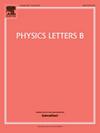寻找弱相互作用大质量粒子在 178m2Hf 异构体上的非弹性散射
IF 4.3
2区 物理与天体物理
Q1 ASTRONOMY & ASTROPHYSICS
引用次数: 0
摘要
介绍了利用178m2Hf异构体对暗物质进行第二次实验搜索的结果。对高能γ射线进行了详细分析。高能γ射线不能在该同分异构体的自发衰变过程中发射,但可能是由于与暗物质粒子的非弹性散射而在178Hf中激发核能级的居群中产生的。从这些γ射线强度的极限得到的暗物质诱导跃迁的半衰期极限已经达到T1/2 >;9.3 × 105年。讨论了这类实验工作的进一步进展。本文章由计算机程序翻译,如有差异,请以英文原文为准。
Search for the inelastic scattering of weakly interacting massive particles on the 178m2Hf isomer
The results of the second experimental search for dark matter using the 178m2Hf isomer are presented. The high-energy γ-rays that cannot be emitted during the spontaneous decay of this isomer but might arise from the population of excited nuclear levels in 178Hf due to the inelastic scattering with dark matter particles are analyzed in detail. The limits on the half-life of the dark-matter-induced transitions, obtained from limits on these γ-ray intensities, have reached T1/2 > 9.3 × 105 years. Further progress of such experimental efforts is discussed.
求助全文
通过发布文献求助,成功后即可免费获取论文全文。
去求助
来源期刊

Physics Letters B
物理-物理:综合
CiteScore
9.10
自引率
6.80%
发文量
647
审稿时长
3 months
期刊介绍:
Physics Letters B ensures the rapid publication of important new results in particle physics, nuclear physics and cosmology. Specialized editors are responsible for contributions in experimental nuclear physics, theoretical nuclear physics, experimental high-energy physics, theoretical high-energy physics, and astrophysics.
 求助内容:
求助内容: 应助结果提醒方式:
应助结果提醒方式:


